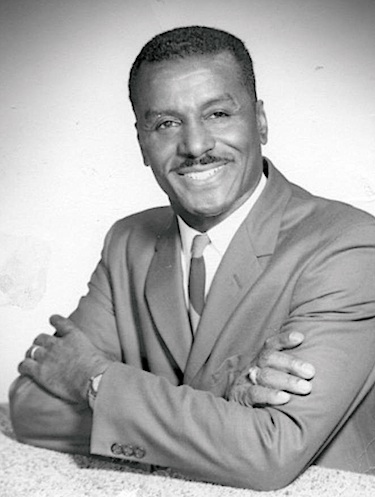 Martin Luther King came to Birmingham in 1963 at the invitation of Reverend Fred L. Shuttlesworth, pastor of Bethel Baptist Church in Collegeville and the local leader of the civil rights movement. Shuttlesworth said the people of Birmingham had prepared for this moment for years and they were ready. Dr. King was welcomed to join them, but Birmingham was going to take on “Bull” Connor and Birmingham City Hall whether Dr. King came or not.
Martin Luther King came to Birmingham in 1963 at the invitation of Reverend Fred L. Shuttlesworth, pastor of Bethel Baptist Church in Collegeville and the local leader of the civil rights movement. Shuttlesworth said the people of Birmingham had prepared for this moment for years and they were ready. Dr. King was welcomed to join them, but Birmingham was going to take on “Bull” Connor and Birmingham City Hall whether Dr. King came or not.
It was not exactly blackmail, but it was close. The style was a perfect example of Shuttlesworth’s approach to civil rights change – activist, aggressive, and nonviolent – in “America’s most segregated city.” King, fresh off a tactical defeat in Albany, Georgia, had little choice. He could either come to Birmingham or risk losing his new-found voice as the spokesman for the civil rights movement in the 1960s. Everyone in America knew that Birmingham would be the major test of King’s nonviolent strategy. If he succeeded in Birmingham, he could succeed anywhere.
King did succeed in Birmingham, and his success lasted until his death by assassination in 1968. Shuttlesworth also succeeded in Birmingham. Ironically, the fiery “Lion of Birmingham,” as Shuttlesworth was called at the time, lived another four decades until he died quietly in bed in Birmingham on October 5 at age 89.
No one in the civil rights movement during the 60s seemed less likely to die in bed of old age than Fred Shuttlesworth. If Shuttlesworth had himself described his own death, he would have called it yet another example of God’s will at work. He had been convinced in 1956, when the parsonage in which he lived was destroyed by a Klansman’s bomb on Christmas Day, that he was God’s anointed. The parsonage was in shambles, the mattress on which he had been sitting was torn apart, glass from the mirror in his bedroom had flown across the room just above his head and stuck like knives in the opposing wall. Yet Shuttlesworth and his family walked out of the rising dust of the ruined parsonage relatively unharmed. To Shuttlesworth, nothing could explain his escape on that Christmas Day except that God had called him to take on the Klan and the injustice of segregated Birmingham. If he did, his actions would be divinely protected.
And so it seems. Shuttlesworth went on to confront segregation fearlessly. The next day in 1956 he led a small group of Negro citizens to sit in the front of a Birmingham bus. Two years later, he was beaten to the ground with chains and brass knuckles when he tried to enroll his children at all-white Phillips High School. His church was bombed again. He met in a strategy session with the Freedom Riders after they were attacked in Birmingham. In 1963, he was knocked off his feet and rolled down the street by the fire hoses during the demonstrations in downtown Birmingham. That fall, he walked with Dwight and Floyd Armstrong, only 9 and 11 at the time, as they became the first black students to desegregate Birmingham’s schools. He was arrested at least thirty-eight times. He taunted “Bull” Connor, calling him up on the phone to announce where he was next going to demonstrate and when. He did everything he could to enrage the entrenched segregationists who governed and controlled Birmingham by law and by force. Yet more than forty years later, he died peacefully in bed. Who is to say that he was not an agent of God’s will?
Dr. King was a powerful writer, an urbane preacher, and a skilled theologian. He was a reluctant activist. He sat down and talked with the forces that were aligned against him. Fred Shuttlesworth was his ally and opposite – a rousing country preacher, a firebrand, a man apparently born into his role as a leader during the Birmingham demonstrations.
History books will record Reverend Shuttlesworth as a fiery and outspoken civil rights activist. What they will miss is that he was also a quiet soft-spoken man devoutly committed to nonviolence, who could sit down and listen intently to both those who agreed with him and those who strongly did not. He loved children. He had a remarkably droll and mischievous sense of humor. That sense of humor will be lost as we canonize him in the history books.
Why did Birmingham succeed when Albany did not? Quite probably, it succeeded because of Fred Shuttlesworth. He was a total and overwhelming strategist who used every method at his disposal. He attacked segregation in the courts, in the mass meetings, in the streets, in strategy sessions with Dr. King and the other SCLC leaders, in the “selective buying” boycott, in the mass arrests, in the creation of the Alabama Christian Movement for Human Rights when the NAACP was outlawed in Alabama, even in sit-down negotiations with Birmingham’s white leadership. His death, even though it came more than four decades after his greatest achievements, is a great loss.
Photo: Courtesy of Birmingham Public Library.
UPDATE, 10.8.2013: An earlier version of this piece included a photo we’d been given recorded verbal and written permission to use in October 2011. The photographer has since asked us to remove it and we’ve chosen to honor her request.
—
Editor’s Note: This remembrance was shared by Wade Black, the executive director of the Birmingham Pledge Foundation. Shuttlesworth in 2000 became the first recipient of the foundation’s Lifetime Achievement Award.







Regarding the City of Birmingham and Feeding the Homeless
EDITOR’S NOTE: There has been a great deal said recently about the food truck ordinance passed late last year and how it’s affecting outreach efforts in the City of Birmingham. Matt Lacey, the senior pastor of downtown’s Church of the Reconciler, has written this piece and shared it via social media and email. I felt it needed another, more openly accessible, place to reside. Links have been added by me where they seemed appropriate. As usual, comments are welcome and his contact information is below (though his email inbox was full as of this posting). ACN
One good way to make kind-hearted folks mad is to tell them it’s illegal for them to show that kindness.
Over the past couple of days here in Birmingham you may have heard reports in the media about the City of Birmingham threatening to arrest people for passing out food to the homeless in public parks and other gathering places.
The Mayor and City Council have said that they didn’t intent to create this type of environment by passing the food truck ordinance last year. Let me take some time to debunk that right away. This text is taken from page 9 of the aforementioned ordinance passed by the City Council:
Why would someone think to include religious and charitable organizations in the ordinance? More than likely they were attempting to bury legislation similar to other cities such as Raleigh, NC and others who have cracked down on public feedings in parks. In short: I think they knew what they were doing when they passed it.
To the issue of feeding at public parks: do churches, organizations, and volunteers need to have a conversation about the effectiveness of public feedings and the need for more permanent and ongoing help for the homeless? Absolutely. Is simply feeding at parks the best way to offer care for the homeless? Well, one could argue that you could do a lot more to offer more comprehensive care.
Organizations like ours-Church of the Reconciler-and the Firehouse Shelter, One Roof, and many others, frequently preach the need for more comprehensive services above and beyond just feeding the homeless. And there is certainly a lot to talk about. But is threatening to arrest people for feeding in public places a way to open up and have that conversation? Absolutely not.
Simply put: I’m not a public policy expert or a politician, but this isn’t going over well for the City of Birmingham. There are better ways to address this issue and have this conversation.
Mayor Bell, who in full disclosure was gracious enough to address one of our fundraising events several years ago, said that this is an effort to consolidate and organize services for the homeless through One Roof. That sounds really good, and One Roof does a great job of coordinating all these efforts currently.
Case in point: when police told Bridge Builders Ministries that they couldn’t serve the homeless outdoors any longer, we had a conversation with their leaders and opened our doors to create a more coordinated effort.
But if the Mayor and the City (and State of Alabama for that matter) are serious about this, it’s time they start providing more resources to care for those on the streets. Simply put: it’s time for Birmingham to stop talking and start doing.
I would like to issue an invitation to the Mayor and City Council members: come down to one of our organizations where, day after day, we offer care to those who need it most, rather than just bury something in an ordinance somewhere. Come and visit with those who suffer with mental illness and tell them, as we do, that there is little to no help we can offer because the State of Alabama lacks the resources (and will) to adequately address the issue. Come and argue, which I do on a weekly basis, with the drug dealers who prey on our population and help keep them in the cycle of addiction.
If we are going to talk about the need for more comprehensive help for the homeless, it’s probably best to not intimidate those attempting to do something about it, even those who might be well-intentioned but need to be more educated.
If the City wants to talk about the homeless in Birmingham, and ways they can help with the community my door is always open, as it has been.
Maybe this is the spark this City needs to starting talking about the issue of homelessness and poverty, which we have only treated with Band-Aids in the past, when in reality it needs comprehensive, holistic, and preventative care.
Rev. Matt Lacey
Senior Pastor, Church of the Reconciler
matt@churchofthereconciler.com
facebook.com/churchofthereconciler
Leave a comment
Posted in Commentary, guest
Tagged Birmingham, Commentary, feeding, guest, homeless, Matt Lacey